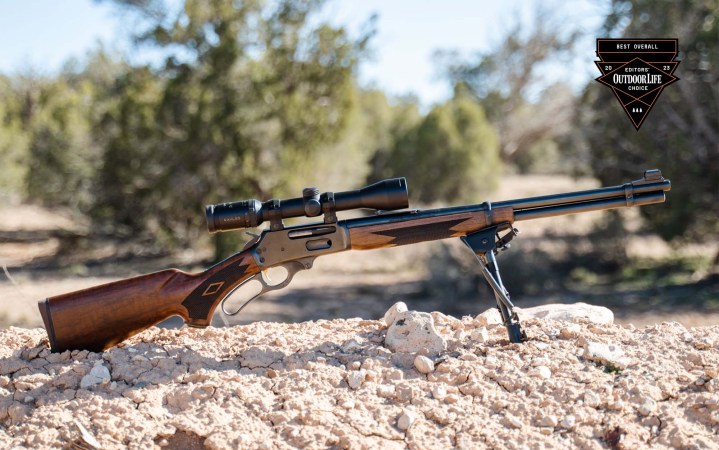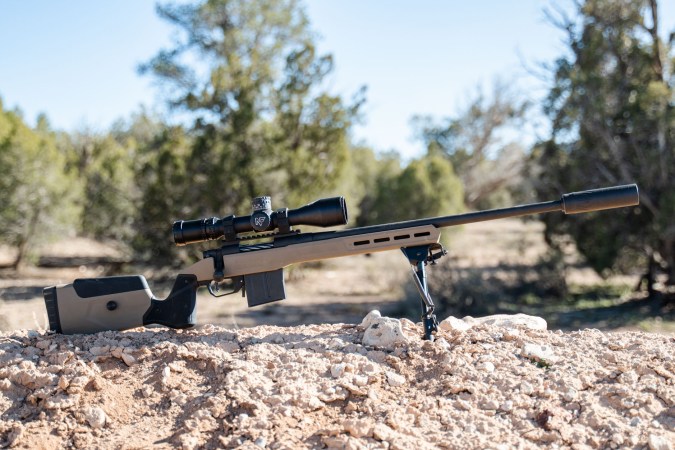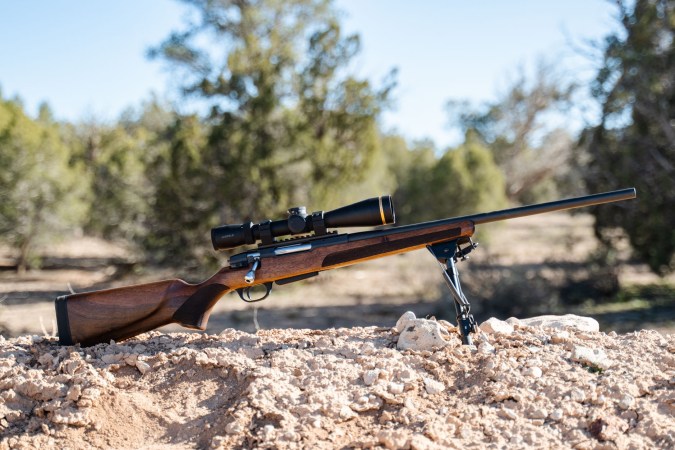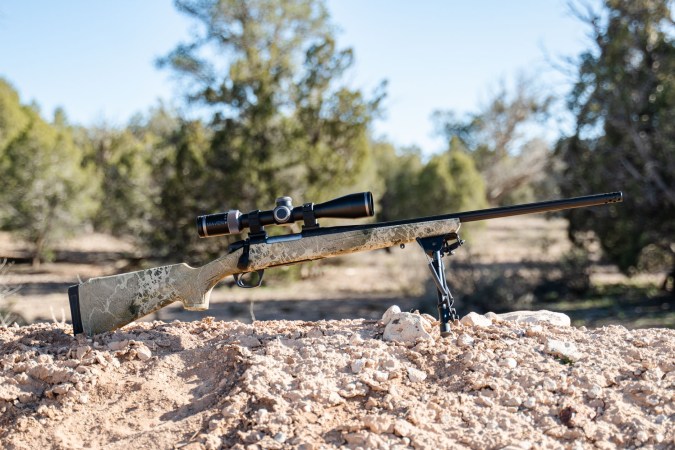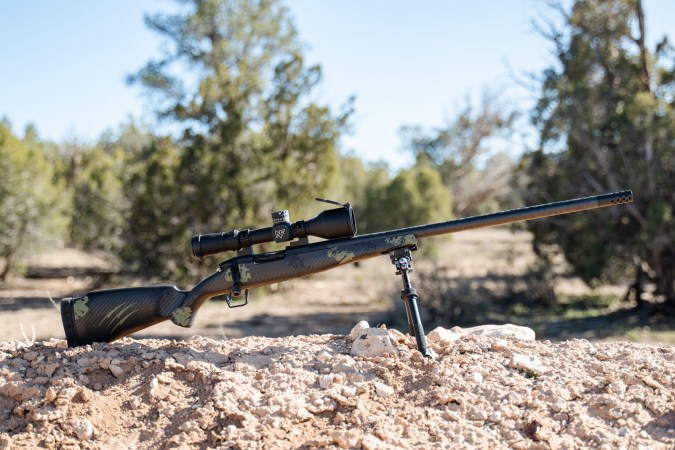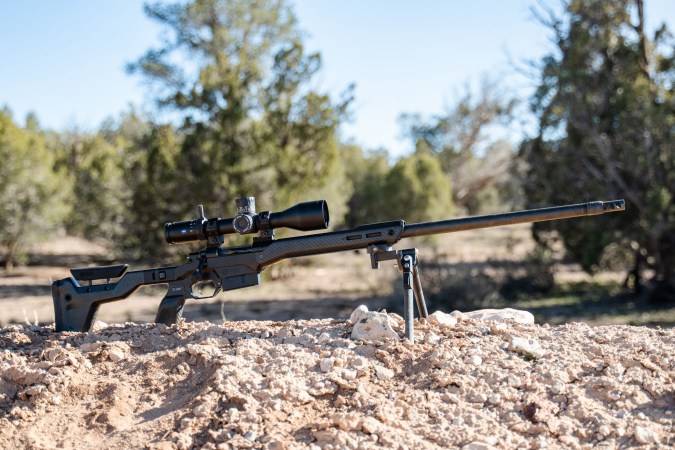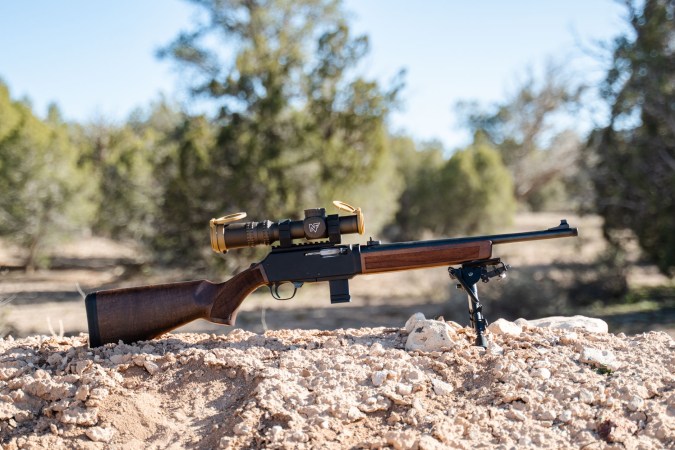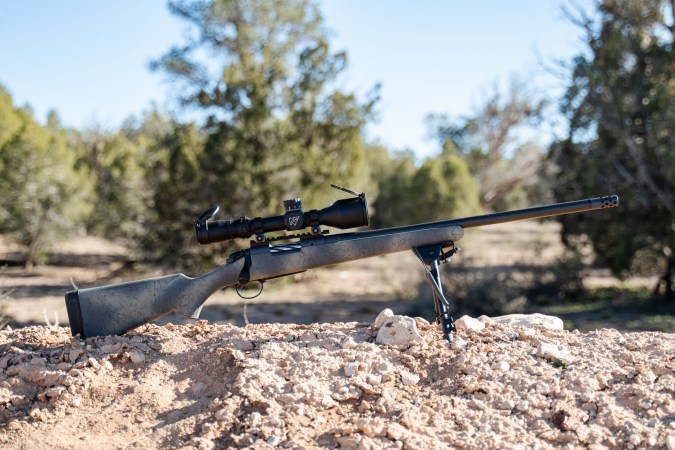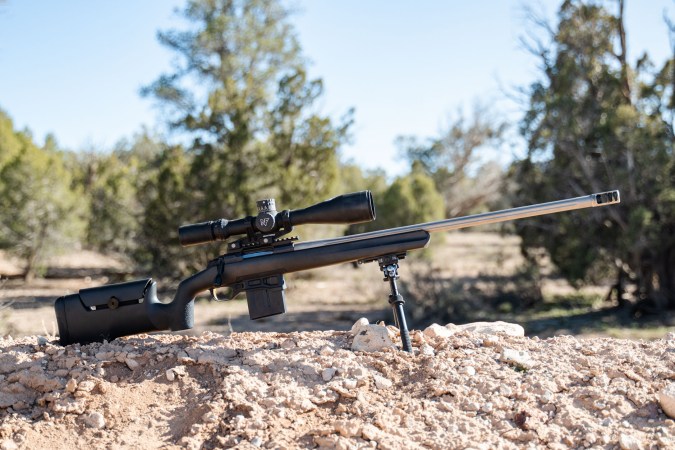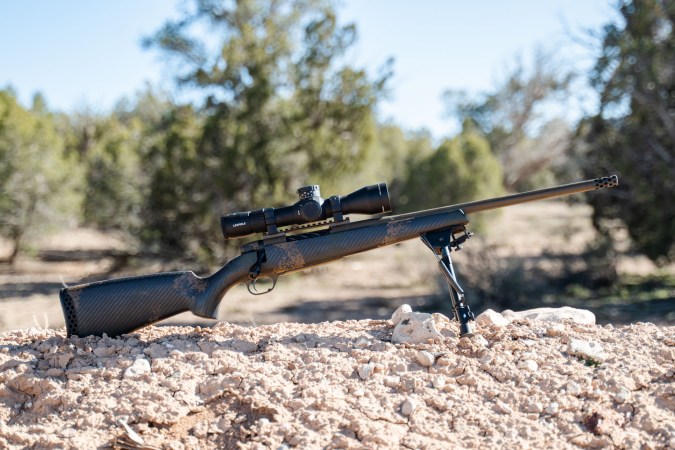We may earn revenue from the products available on this page and participate in affiliate programs. Learn More ›
For the second year in a row the Outdoor Life gun test team converged on Gunsite Academy to generate our decades-long roundup of the year’s best rifles, best handguns, and—as a bonus to you old-school pistoleros—a test of the best 1911s.
We’ve been conducting this massive gun test for decades now. It is the most time-consuming, ambitious, and costly editorial project Outdoor Life does each year. No other publication or group comes close to duplicating this singular effort. More on that in a bit.
First and foremost, the test is motivated by our desire to provide valuable and unbiased data and insight. There’s a lot of low-quality information about new guns out there. A combination of evaluators with questionable skills, limited resources, and a desire to please sponsors and advertisers results in a preponderance of ballistic drivel.
So I get why many readers react to gun reviews with reflexive cynicism. Sadly, that jaded response is often justified.
This test is an antidote to that.
Beyond providing our audience with top-quality, honest content, the Outdoor Life gun test team also derives tremendous professional satisfaction from this project. The opportunity to shoot all these guns side-by-side with a nearly inexhaustible supply of ammunition at hand gives a perspective that you can’t acquire shooting them individually. Evaluating firearms in the context of their peer group is remarkably illuminating.
Best Rifles of 2023: Return of an Icon and Some Amazing Values
This year’s rifle field was smaller than last year’s. (The bursting of the post-Covid bubble accounted for the unusually large number of introductions in 2022.) But it still included an interesting variety of long-guns spanning a spectrum of price points and uses.
One dominant theme among the best rifles of 2023 is budget guns that punch above their weight class. The Stevens 334 Walnut and Mossberg Patriot LR Tactical both distinguished themselves in that light and earned this year’s Great Buy awards. We also gave high marks to the CVA Cascade XT for the value it represents. In 2023, bargain-minded shooters have some good options to pick from.
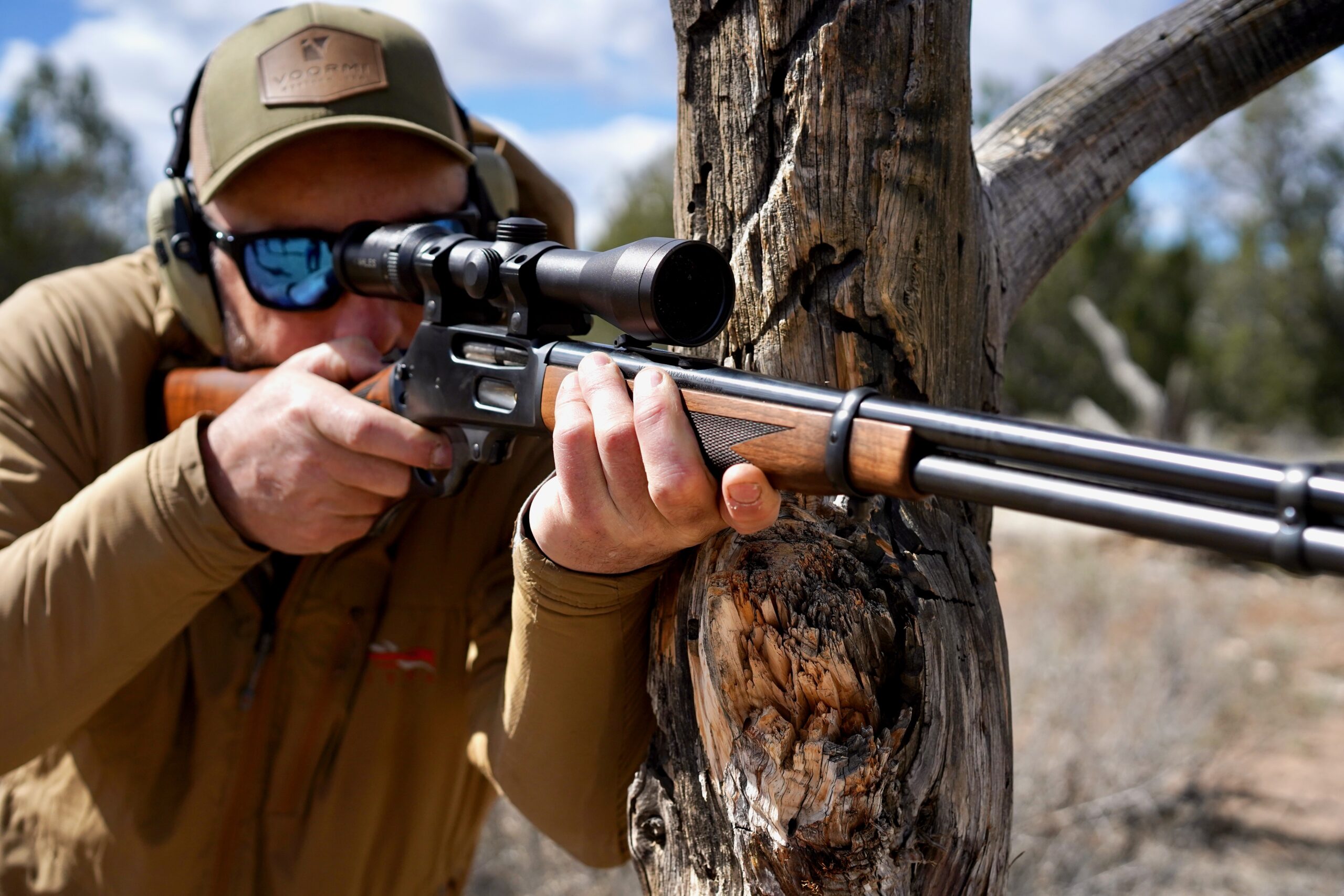
Another takeaway from the gun test is that Marlin’s resurrection by Ruger can now be deemed a complete and legitimate success. The new Marlin 336 Classic we evaluated is the latest in a string of fabulous lever actions that have been rolling off the production line at Ruger’s facility in Mayodan, North Carolina. In conjunction with the Marlin 1895 SBL we tested and the Marlin 1895 Trapper we’ve been using—both in .45/70—the Marlin 336 Classic cements the iconic brand’s comeback.
We were so smitten with the Marlin 336 Classic that it was the unanimous selection as this year’s Editor’s Choice.
How We Tested the Best Rifles
As I alluded to above, Outdoor Life’s gun testing protocol is unlike any other in the outdoor industry. This test is different, and always has been. We pit the entries head-to-head and when the dust settles we tabulate the scores and whoever wins, wins. There’s no favoritism at play. Unlike other awards you see touted, our Editor’s Choice and Great Buy honors are not for sale.
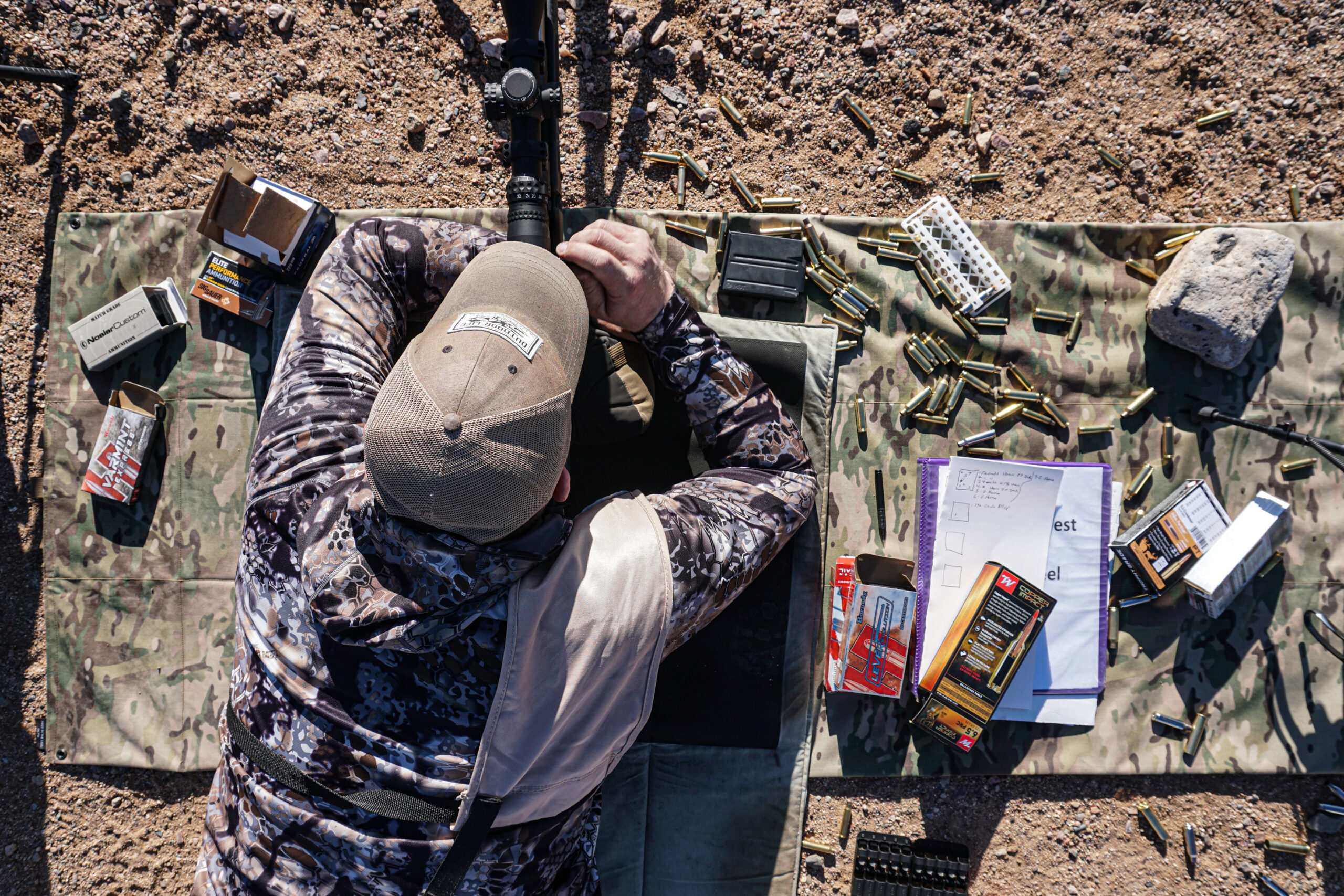
We shoot the hell out of each rifle for accuracy and practical field handling. We go over each with a critical eye to pick apart their construction and evaluate workmanship.
Our published accuracy results are the averages of the 10 best five-shot groups for each rifle. While it is fun to highlight some of the smallest groups in the test—which we do as well—this 10-group average is much more meaningful with respect to a rifle’s true in-the-field performance. (And, incidentally, is a much tougher standard than you’ll see in other gun reviews.)
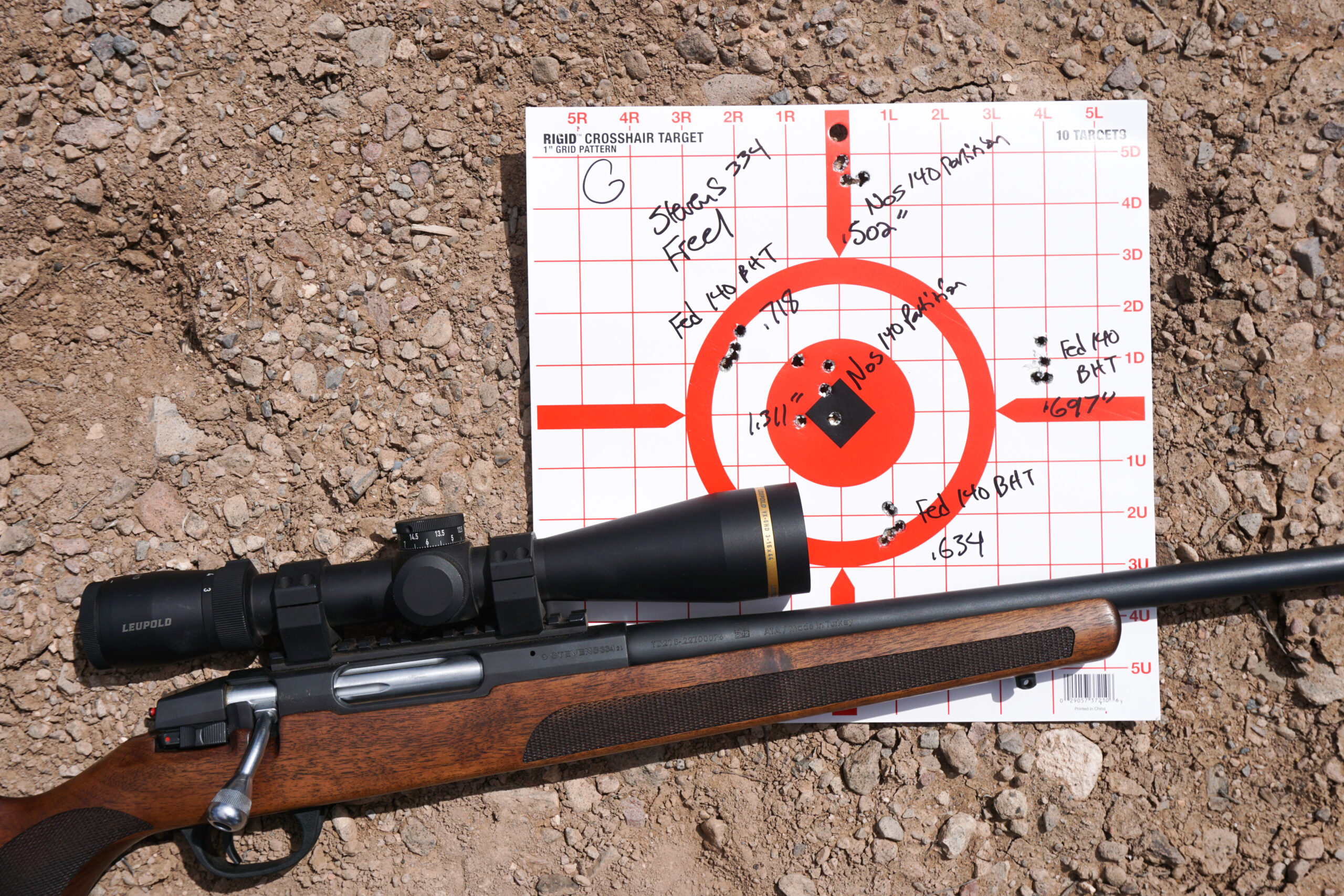
It takes a long time to gather that much accuracy data. The five shooters on the team spent days shooting a collective 375 five-shot groups for record. One reason we shoot that much is that we want each rifle to shine as brightly as possible. We shoot a variety of ammo, bullet styles, and bullet weights. (With respect to the ammunition I have to give special thanks to our industry partners who support us in this including, Federal, Nosler, Winchester, Hornady, Remington, Black Hills Ammunition, Berger, Weatherby, Wilson Combat, and Freedom Munitions.)
And in between groups we cleaned the rifles if needed and refouled them to get the most accuracy out of each. When the accuracy work was done, we ran each rifle through dynamic shooting drills from field positions.
How We Grade Guns
Each rifle is evaluated on nine categories and given a score of 1 to 5 from each judge, except for the accuracy score, which is based on the data from the groups shot. We average the scores for each category and use that to determine the ranking and awards. The categories are handling, accuracy, workmanship, aesthetics, ergonomics, meets purpose, versatility, reliability, and value.
Read Next: The Best Handguns of 2023
The scores then translate to the grades on the report cards for each firearm. Performance consists of the scores from handling, accuracy, ergonomics, and reliability. Design includes workmanship, aesthetics, meeting its purpose, and versatility. Value stands on its own.
To earn an “Excellent” rating, the average of that score must be 4.5 or higher, a difficult mark to hit. “Very Good” is an average score of 3.5 to 4.5; “Good” is from 2.5 to 3.5; “Fair” is from 1.5 to 2.5; and “Poor” is under 1.5.
Report Card
- Performance: Very Good
- Design: Very Good
- Value: Very Good
- Accuracy: 1.627 in. (Avg. of 10 best five-shot groups)
Marlin 336 Classic Specs
- Action: Lever
- Stock: Walnut
- Caliber: .30/30 Win.
- Capacity: 6+1
- Weight: 7 lb. 1 oz.
- Trigger: 8 lb. 0 oz.
- Barrel: 20 in.
- Length: 38.5 in.
- Price: $1,239

The biggest trend in rifles for the last decade and a half has been in bolt guns pushing the boundaries of accuracy and long-range performance. In other words, precision rifles—whether for competition, hunting, or general recreation.
So it is rather surprising to see a rifle that traces its roots to 1893 firing a cartridge that was introduced in 1895 anointed as the best rifle of 2023. But indeed, that is the case.
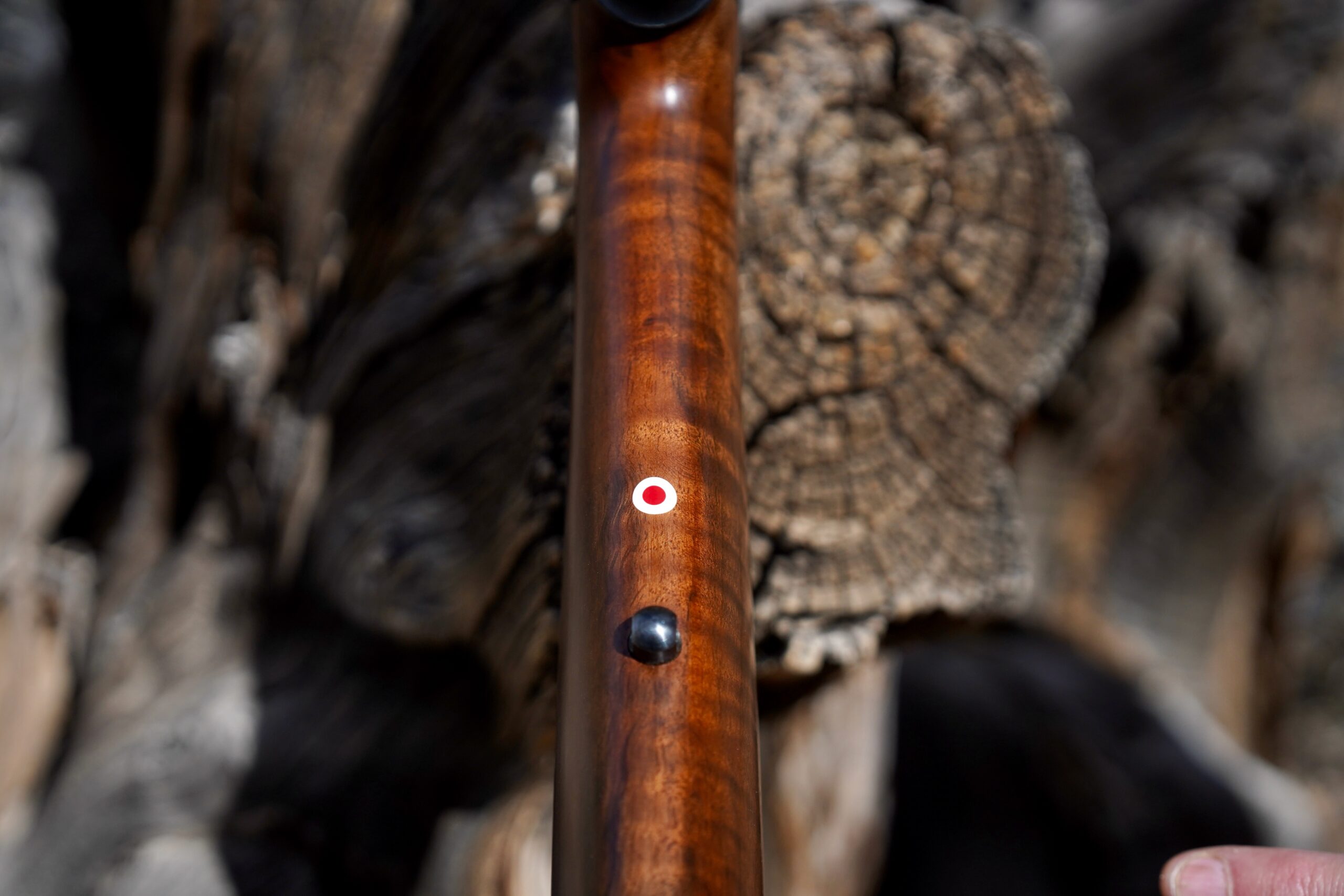
The Marlin 336 Classic in .30/30 Win. is a throwback rifle and cartridge but has been made relevant again by Ruger, which is producing them in North Carolina. Even though I grew up shooting Marlins produced in North Haven, Connecticut, there is no doubt that these new lever actions are the finest to wear the signature bullseye logo in their stock.
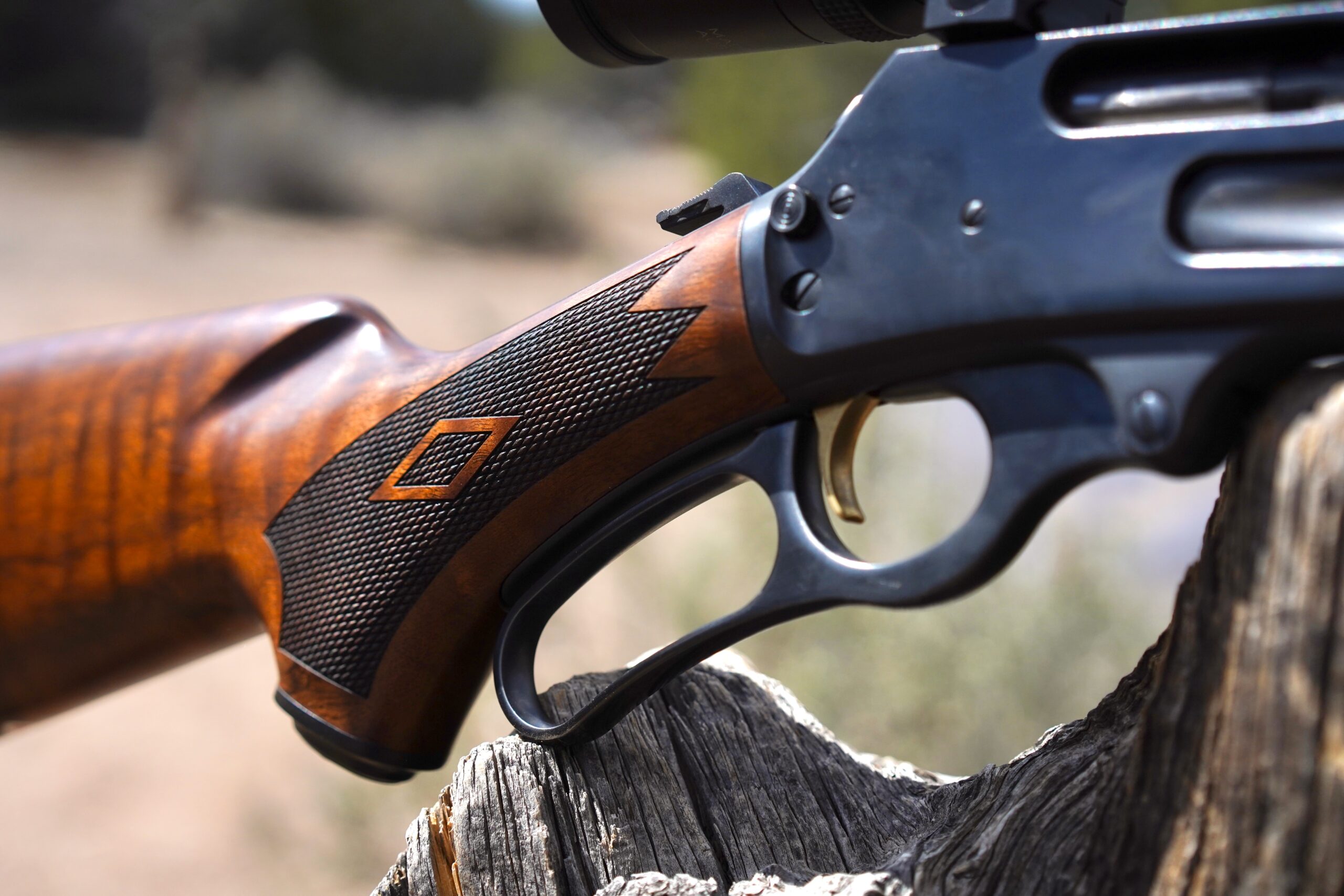
The fit and finish on our 336 was superlative and the quality of the wood, metal polish, and bluing make this rifle a real looker. As much as we were smitten by its svelte lines and attractive workmanship, we also praised it for its balance and handling.
The 336 handles exactly how a big-woods lever action should. It’s quick to shoulder, points instinctively, and—for a lever gun in .30/30—is pretty accurate.
It’s also a hell of a value—assuming you can find one for the MSRP. For the time being the demand will continue to outstrip the supply but be patient and sooner or later you’ll be able to acquire one.
As an aside, Marlin will be chambering the 336 in .35 Remington again too. Expect to see those later this year. Nor would it shock me if they chambered some in the new 360 Buckhammer as well.
Report Card
- Performance: Very Good
- Design: Good
- Value: Excellent
- Accuracy: .582 in. (Avg. of 10 best five-shot groups)
Mossberg Patriot LR Tactical Specs
- Action: Two-lug bolt
- Stock: Synthetic chassis
- Caliber: 6.5 CM
- Capacity: 10
- Weight: 8 lb. 11 oz.
- Trigger: 2 lb. 9 oz.
- Barrel: 22 in.
- Length: 42.3 in.
- Price: $1,085
We have been shooting, hunting with, and broadly praising the Mossberg Patriot rifle in its many variants since it was introduced in 2015. New this year is the Mossberg Patriot LR Tactical, which matches the familiar two-lug action with a chassis stock and heavy barrel.
Line extensions like this tend to be ho-hum affairs, eliciting little in the way of remark, let alone excitement. That’s not the case with the Patriot LR Tactical.
This precision rifle is one of the best deals going for affordable long-range shooting and trotted off with a Great Buy award in the precision rifle category.
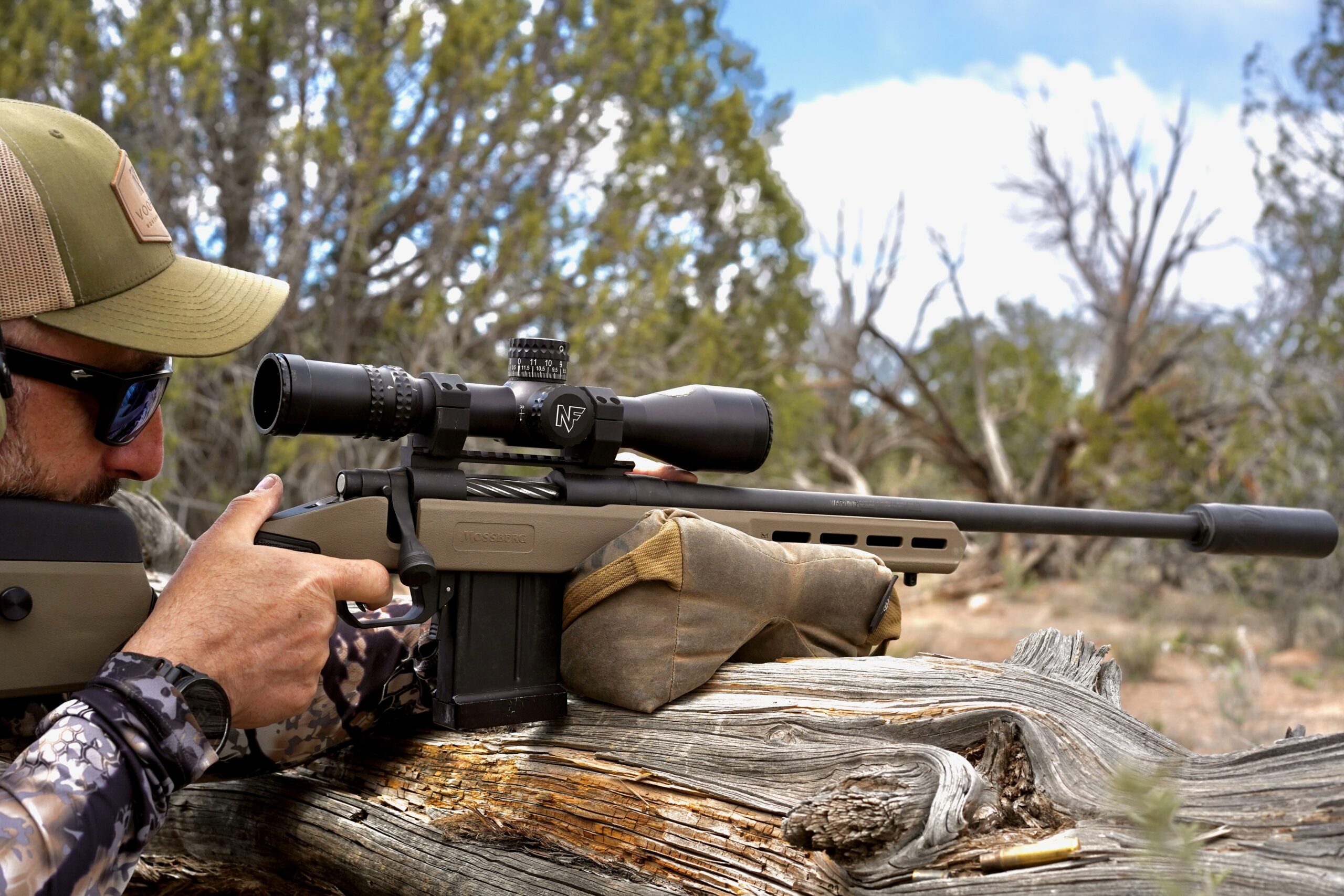
This LR Tactical configuration suits the workmanlike Patriot action to a tee. This rifle is very accurate. In fact, it turned in the tightest group of the test, a .247-inch five-shot group by editor in chief Alex Robinson with Federal 140-grain Berger Hybrids. (Ours was chambered in 6.5 Creedmoor, but you can also get them in .308 Win. and 6.5 PRC.)
The rifle also handles surprisingly well. Though the barrel is heavy, the rifle isn’t cumbersome. It weighs 8.75 pounds without a scope and was easy to maneuver in and out of position during the practical shooting portion of the evaluation.
The action isn’t the smoothest but we were still able to cycle it quickly while running through a variety of drills. The rifle takes AICS pattern magazines, which are widely available and come in varying capacities. The effective paddle magazine release made reloads a snap.
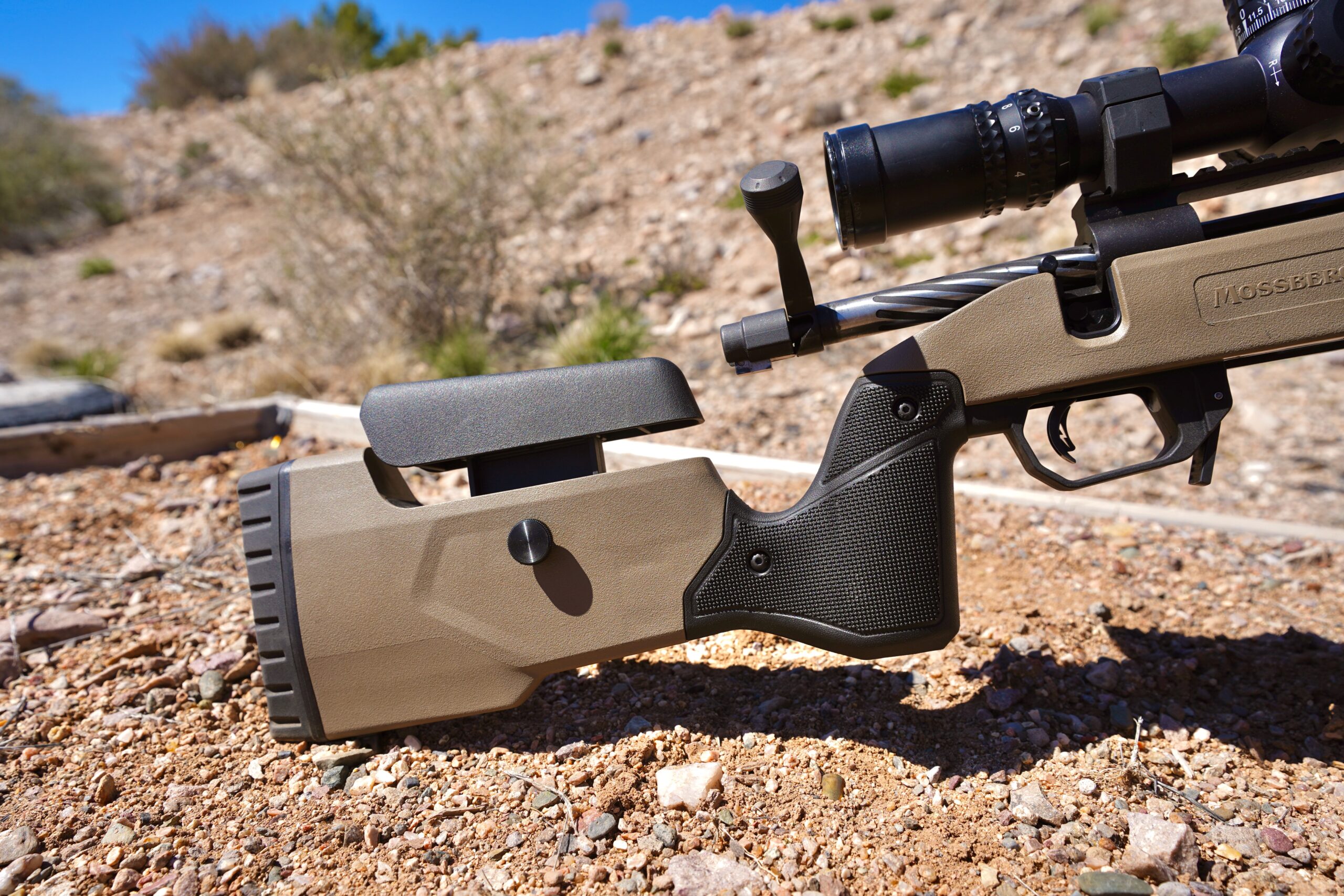
The stock adjusts for cheek height and positions the hand nicely thanks to its vertical grip. The texturing on the grip is fairly aggressive and gives a solid purchase. The chassis stock also has slots to mount M-Lok compatible accessories.
Best Rifle of 2023: Stevens 334 Walnut (Great Buy, Hunting Rifle)
Report Card
- Performance: Good
- Design: Good
- Value: Excellent
- Accuracy: .724-in. (Avg. of 10 best five-shot groups)
Stevens 334 Walnut Specs
- Action: Three-lug bolt
- Stock: Walnut
- Caliber: 6.5 CM
- Capacity: 3+1
- Weight: 7 lb. 14 oz.
- Trigger: 5 lb. 10 oz.
- Barrel: 22 in.
- Length: 43 in.
- Price: $489
The Stevens 334 Walnut was the most surprising gun of the rifle test. It is a basic wood-stocked bolt action imported from Turkey, and at first glance doesn’t seem to be anything special.
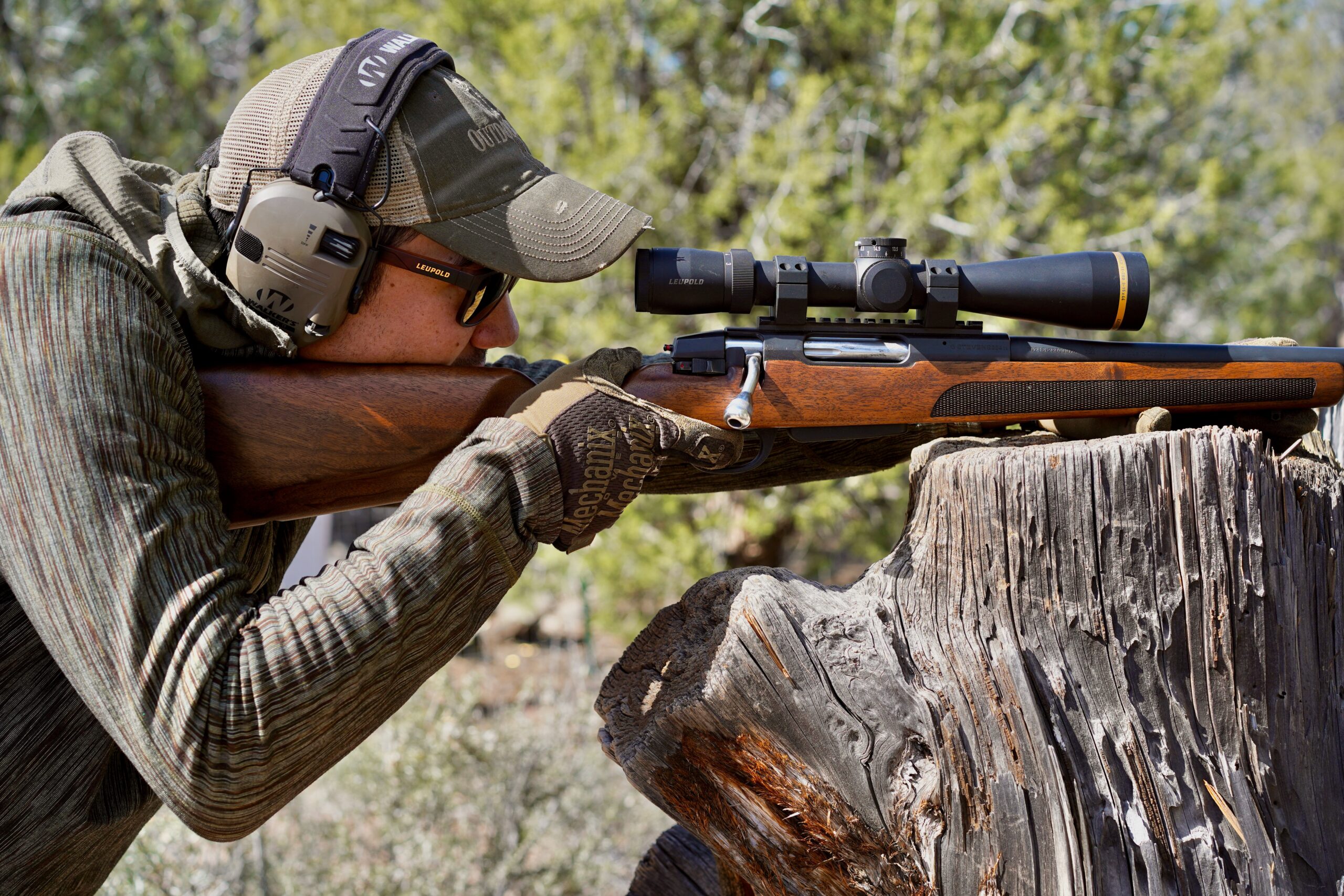
While the stock is nice enough, the metalwork and design of the action is basic—though in keeping with the rifle’s modest $489 price tag. After dry firing the trigger, you’d have no reason to anticipate any particular ballistic magic, either. The 5-pound 10-ounce trigger has a bit of mush before it breaks.
But handsome is as handsome does, and the Stevens 334 charmed the entire test team once we started shooting it for accuracy. Its five-shot groups averaged less than ¾ MOA, making it one of the most accurate rifles of the test, and easily the most accurate hunting rifle we evaluated.
It shoots way better than it has any right to, was our collective takeaway.
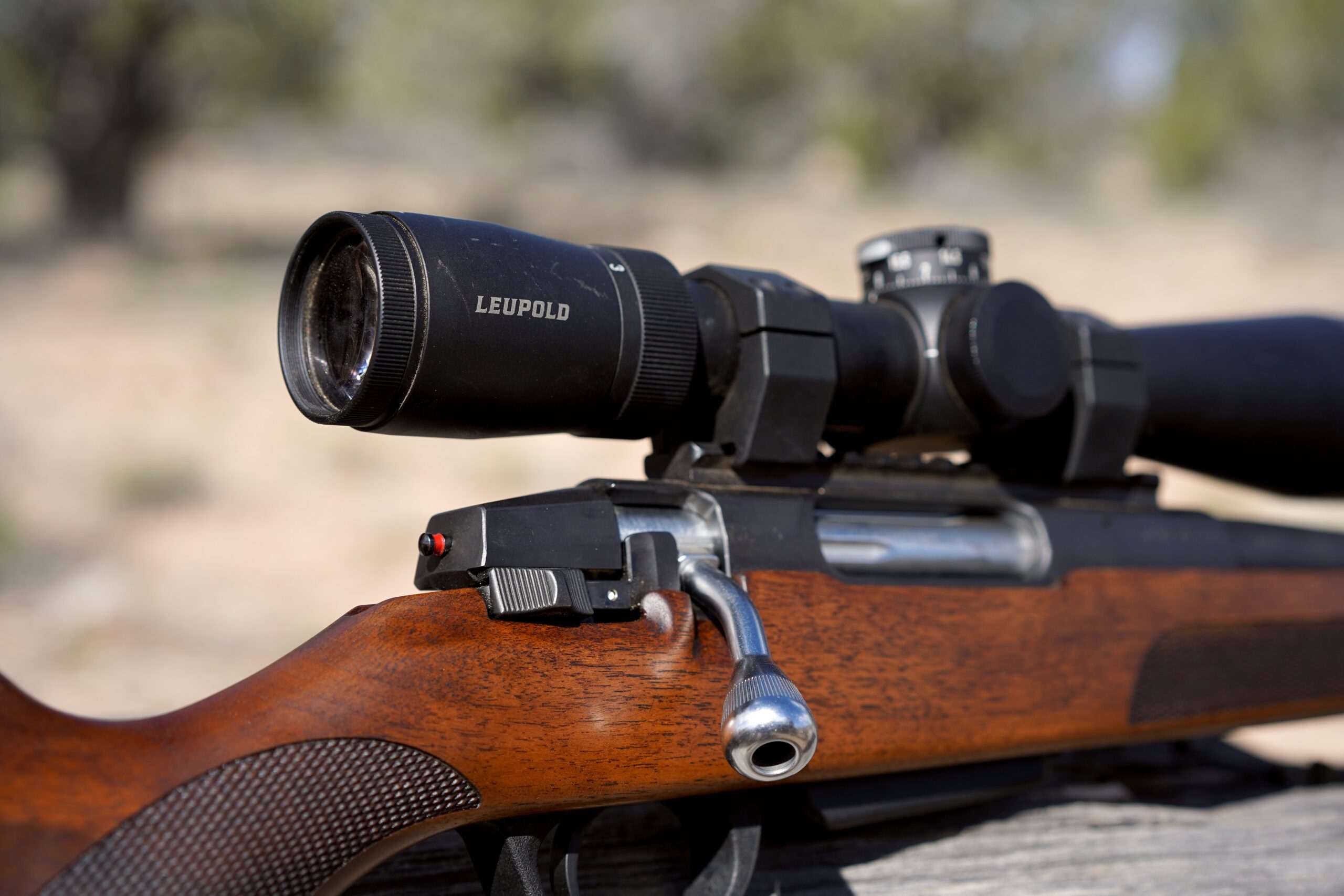
It has other features we liked as well. The three-position safety locks the bolt down when fully engaged, while the central position lets the shooter clear or check the chamber without putting the gun on “fire.”
The polymer single-stack magazine loads easily and holds three rounds of 6.5 Creedmoor, though the rifle is also available in .308 Win. and .243 Win.
The three-lug design, with its 60-degree bolt lift, is surprisingly smooth and easy to operate from the shoulder. It comes with a Picatinny rail that runs the full length of the action which makes mounting an optic a snap.
In sum, the Stevens 334 Walnut is a wonderful rifle for the price and is our Great Buy award winner in the hunting rifle category in 2023.
Report Card
- Performance: Good
- Design: Good
- Value: Very Good
- Accuracy: .858 in. (Avg. of 10 best five-shot groups)
CVA Cascade XT Specs
- Action: Three-lug bolt
- Stock: Synthetic
- Caliber: 6.5 CM
- Capacity: 4+1
- Weight: 7 lb. 7 oz.
- Trigger: 2 lb. 12 oz.
- Barrel: 22 in.
- Length: 43.6 in.
- Price: $850
The CVA Cascade XT is another solid value among this year’s new rifles. Like other rifles in the Cascade family, it has a three-lug, large-diameter bolt and a two-position safety that is easy to manipulate.
Larger and heavier than the other Cascade rifles, it was built with hunting at longer distances in mind. It comes with a stout No. 5 contour barrel, dual swivel studs on the fore-end, a radial muzzle brake, and a user-adjustable trigger.
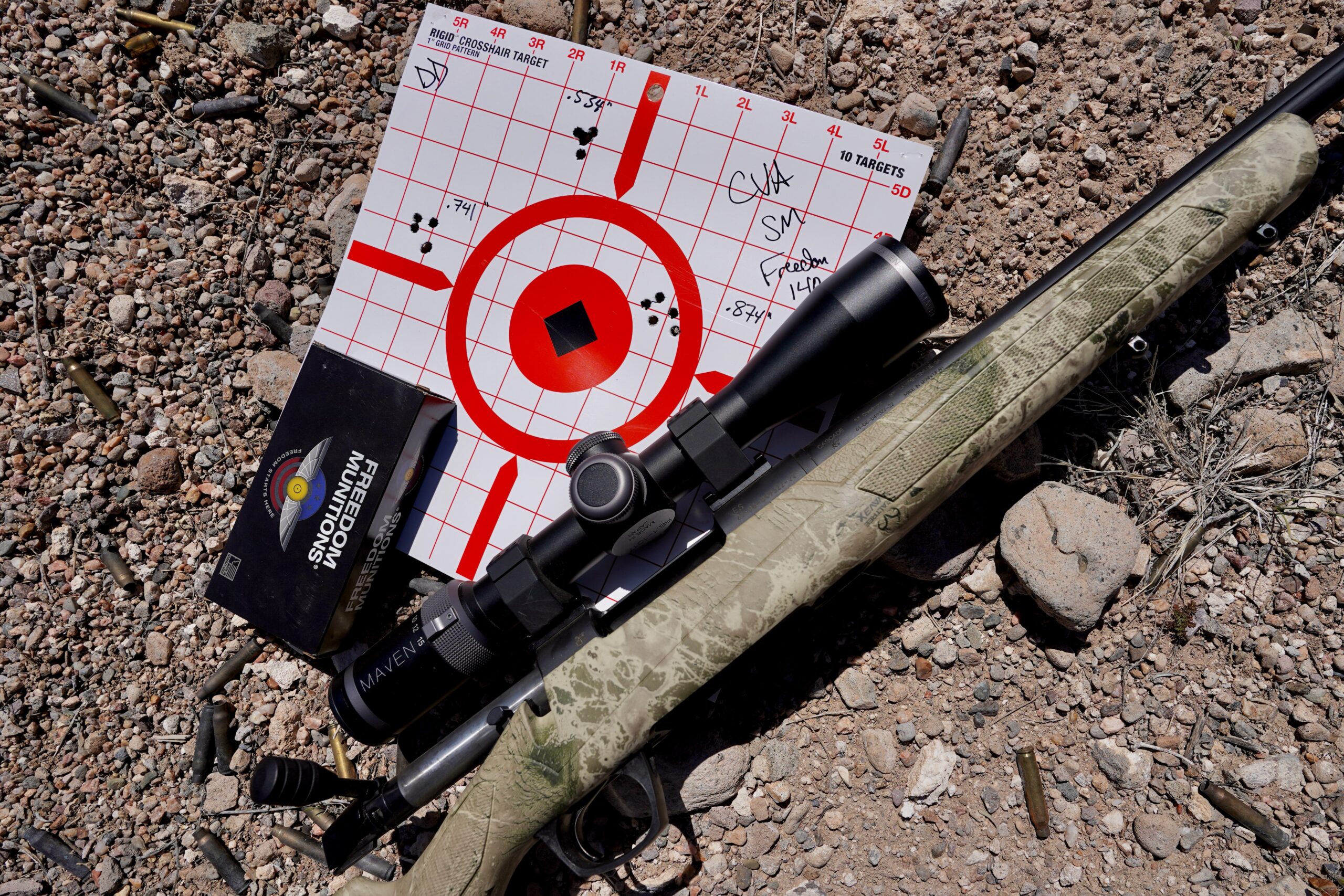
It isn’t an elegant rifle. Nothing on it can be considered svelte. But for its intended purpose—placing accurate shots at longer distances—it hits the mark.
The rifle’s weight, stock design and brake do a good job mitigating recoil, so it is a rifle you can put a lot of rounds through without beating yourself up.
The polymer double-stack magazine holds four rounds of 6.5 Creed. (The rifle can also be had in .223 Rem., .308 Win., .450 Bushmaster, .350 Legend, 6.5 PRC, 7mm Rem. Mag., and .300 Win. Mag.) It loads effortlessly and is easy to insert and remove from the mag well.
The double-stack design and open-bridge configuration of the action make it easy to top-load the magazine when it runs dry. That’s a good thing, because when we fed the rifle with single rounds after emptying the magazine they often had difficulty chambering.
The synthetic camo stock has a tacky rubber-like texture and effective checkering molded into the fore-end and grip, so you won’t need to worry about this rifle slipping from your grasp.
Report Card
- Performance: Good
- Design: Very Good
- Value: Good
- Accuracy: 1.033 in. (Avg. of 10 best five-shot groups)
Fierce Firearms Carbon Rogue Specs
- Action: Two-lug bolt
- Stock: Carbon fiber
- Caliber: 6.5 PRC
- Capacity: 3+1
- Weight: 6 lb. 4 oz.
- Trigger: 3 lb. 1 oz.
- Barrel: 24 in.
- Length: 45.5 in.
- Price: $2,199
We’ve been a big fan of Fierce Firearms’ rifles. This semi-custom maker based in Redmond, Utah, makes high-quality lightweight big-game rigs that perform under trying conditions. Their prices, while not cheap, represent a good value for the quality.
New this year is the Carbon Rogue, which Fierce introduced as a more affordable carbon-fiber barreled mountain rifle at $2,199. To get the cost down, the Carbon Rogue uses a stainless two-lug action, rather than the titanium actions found in the flagship Edge ($3,995) and Rival ($3,050).
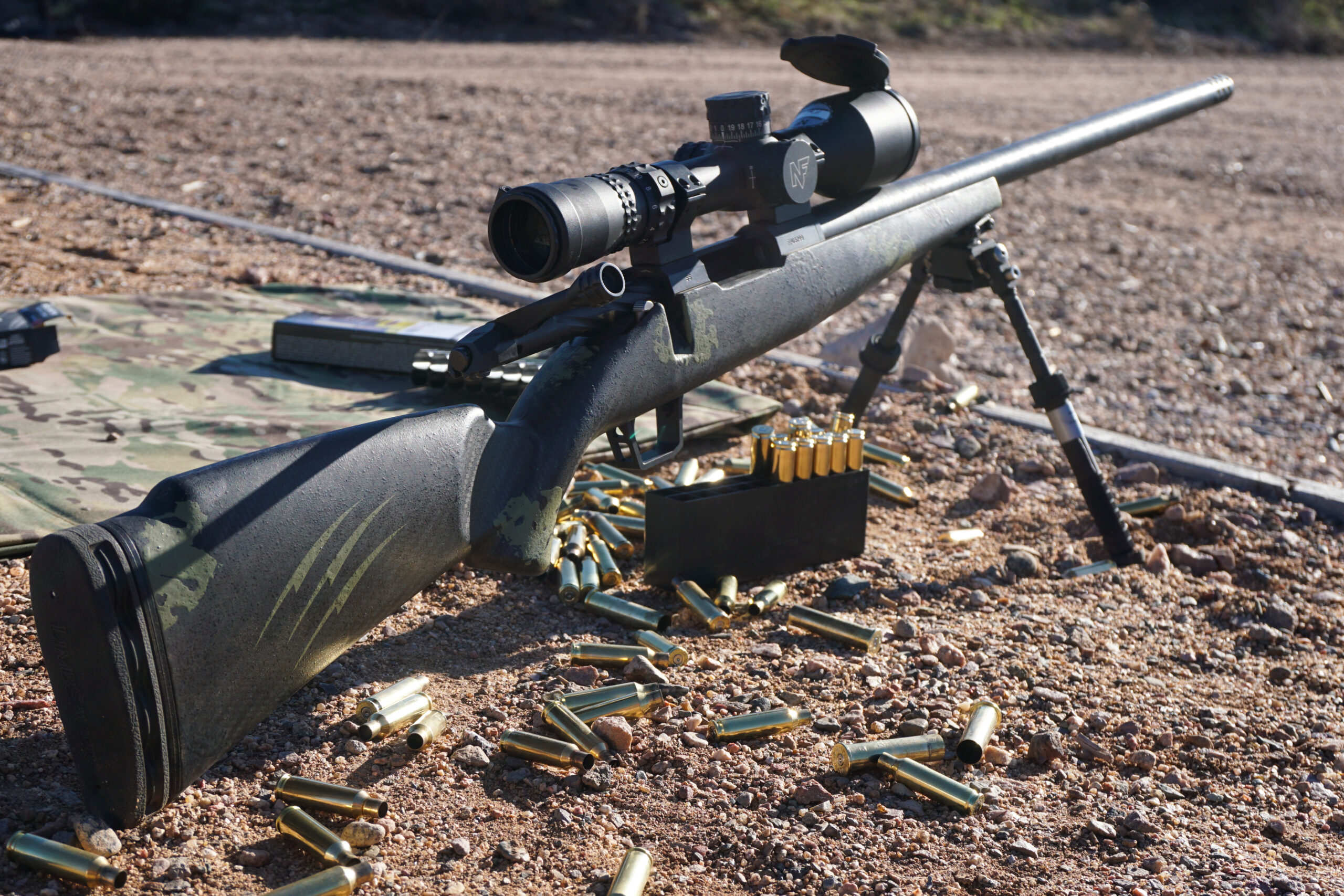
The fit and finish on the rifle is superb. The hinged floorplate magazine, for instance, is nicely inletted so that it sits nearly flush with the stock. Likewise, the gap between the barrel and barrel channel is small and even.
The accuracy of our sample in 6.5 PRC didn’t wow us. At 1.033 inches it was good but not outstanding. We had some feeding issues with our sample too. The second round in the magazine rarely fed properly because of how it would tilt in the magazine. This is something that wouldn’t be too difficult to resolve, but it did cost the rifle some points.
Other than that, the rifle impressed us. Most of the judges loved the shape of the stock, which has a moderate swell at the grip—though one of our evaluators who has smaller hands found it awkward.
Like many carbon-fiber stocks, the one on our sample is a bit slick. Some hunters make a big deal out of that, while others don’t care. It’s a matter of personal taste.
One thing about the stock we all liked was the short section of Picatinny rail recessed into the fore-end. It’s a great mounting surface for clamping on a bipod in a flash. The rail has a QD cup in it as an attachment point for a sling, and the buttstock of the rifle has a QD cup as well.
The spiral fluted bolt can be taken apart without tools in the field for maintenance, and it incorporates dual ejectors and a nicely designed extractor. We didn’t have any issue with extraction and ejection of the empties.
At 6-pounds 4-ounces, the empty weight of the rifle makes it portable but it still has enough heft to handle properly. During the dynamic drills the rifle was nimble and steady. Fierce is chambering these rifles in a slew of cartridges ranging from the .22 Creedmoor to the .300 PRC.
Nosler CCH (Carbon Chassis Hunter)
Report Card
- Performance: Very Good
- Design: Very Good
- Value: Fair
- Accuracy: .913 in. (Avg. of 10 best five-shot groups)
Nosler CCH Specs
- Action: Two-lug bolt
- Stock: Carbon fiber folding chassis
- Caliber: 6.5 PRC
- Capacity: 4+1
- Weight: 6 lb. 10 oz.
- Trigger: 2 lb. 13 oz.
- Barrel: 26 in.
- Length: 45.25 in.
- Price: $5,295
Any notion you might have had of Nosler as an old-school firearm and ammunition company that caters to your grandpa is dispelled by the new Carbon Chassis Hunter (aka CCH). This thoroughly modern rifle is a marked departure from the traditional lines of the M48 that Nosler launched their firearms business with nearly 20 years ago.
It takes the same action as their award-winning Model 21 and pairs it with a folding carbon-fiber stock made by MDT to cater to technically savvy (and well-heeled) hunters.
If I had to describe the CCH in one word, I’d go with slick. Slick describes the smooth-running action, which was our favorite of the test, as well as the feel of the non-textured chassis stock.
The slickness of the chassis, which in theory makes the rifle more difficult to hold on to, is largely mitigated by the pistol grip, which allows for a strong handhold on the rifle. The flat-bottomed fore-end, which has an integral ARCA rail machined along its length, is easy to grasp firmly, too.
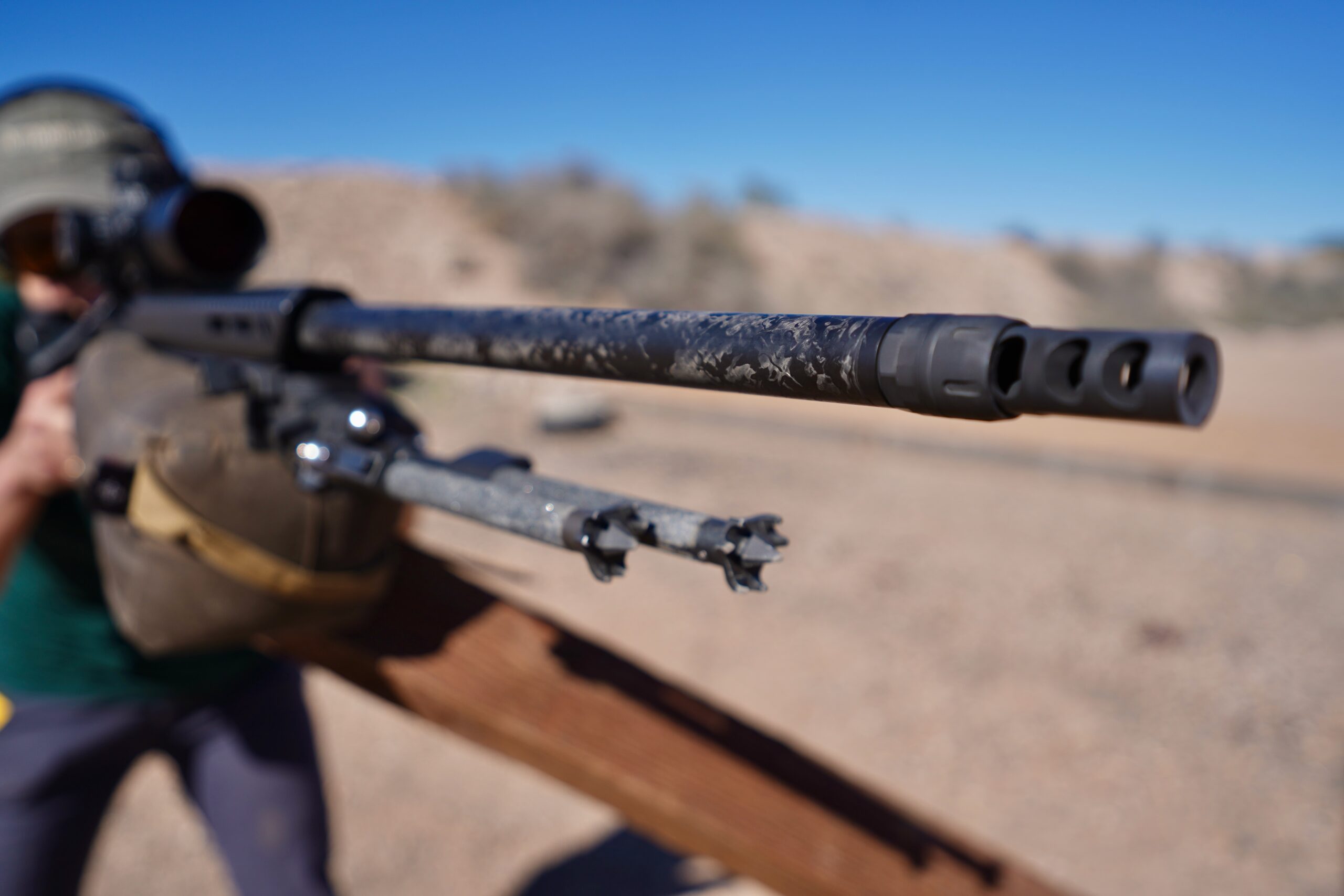
Our sample, chambered in 6.5 PRC, has a 26-inch barrel. Normally that makes for an unwieldy rifle, but the light weight of the carbon fiber barrel helps the rifle balance well. Even with that long tube, the rifle tips the scales at just over 6.5 pounds.
Because the stock folds flat, transporting the rifle is more convenient too. I carried this rifle last fall on a spot-and-stalk mule deer hunt in Northeast Montana and slinging the rifle with the stock folded made for easy hiking.
The accuracy of our rifle was good, but we found it a struggle to get great groups out of it. We turned in a handful of five-shot groups between .65 and .85 inches, which is quite good. But most of our shooting was right around the 1 MOA mark.
There’s nothing wrong with that level of precision, but for the price you couldn’t blame a guy if he expected a bit more.
Speaking of the price: If the CCH has an Achilles heel, it is cost. Nosler spared no expense assembling best-in-class components to build the rifle and—for better or for worse—that expense is passed along to you. The Proof Research barrel, Mack Bros action, TriggerTech trigger, and MDT Chassis aren’t cheap. With an MSRP of $5,295, this isn’t an everyman’s hunting tool.
It’s capable, fun to shoot, pretty accurate, has wonderful balance and handling—but whether the shooting public will take a shine to it to the tune of 5Gs remains to be seen.
Report Card
- Performance: Very Good
- Design: Very Good
- Value: Very Good
- Accuracy: 2.21 in. (Avg. of 10 best five-shot groups @ 50 yd.)
Henry Repeating Arms Homesteader Specs
- Action: Semi-auto
- Stock: Walnut
- Caliber: 9mm
- Capacity: 10
- Weight: 6 lb. 10 oz.
- Trigger: 6 lb. 10 oz.
- Barrel: 16 in.
- Length: 35.75 in.
- Price: $928
The fun factor of the Henry Homesteader is undeniable. This simple 9mm PCC, which operates from standard pistol magazines on a blowback design, quickly established itself as a test team favorite.
It is reasonably accurate, has negligible recoil, doesn’t cost a ton, is super handy, and fires cheap ammo. What’s not to like? I wrote about the Homesteader at some length after I first got it, and it turned out that the other judges shared my positive impression.
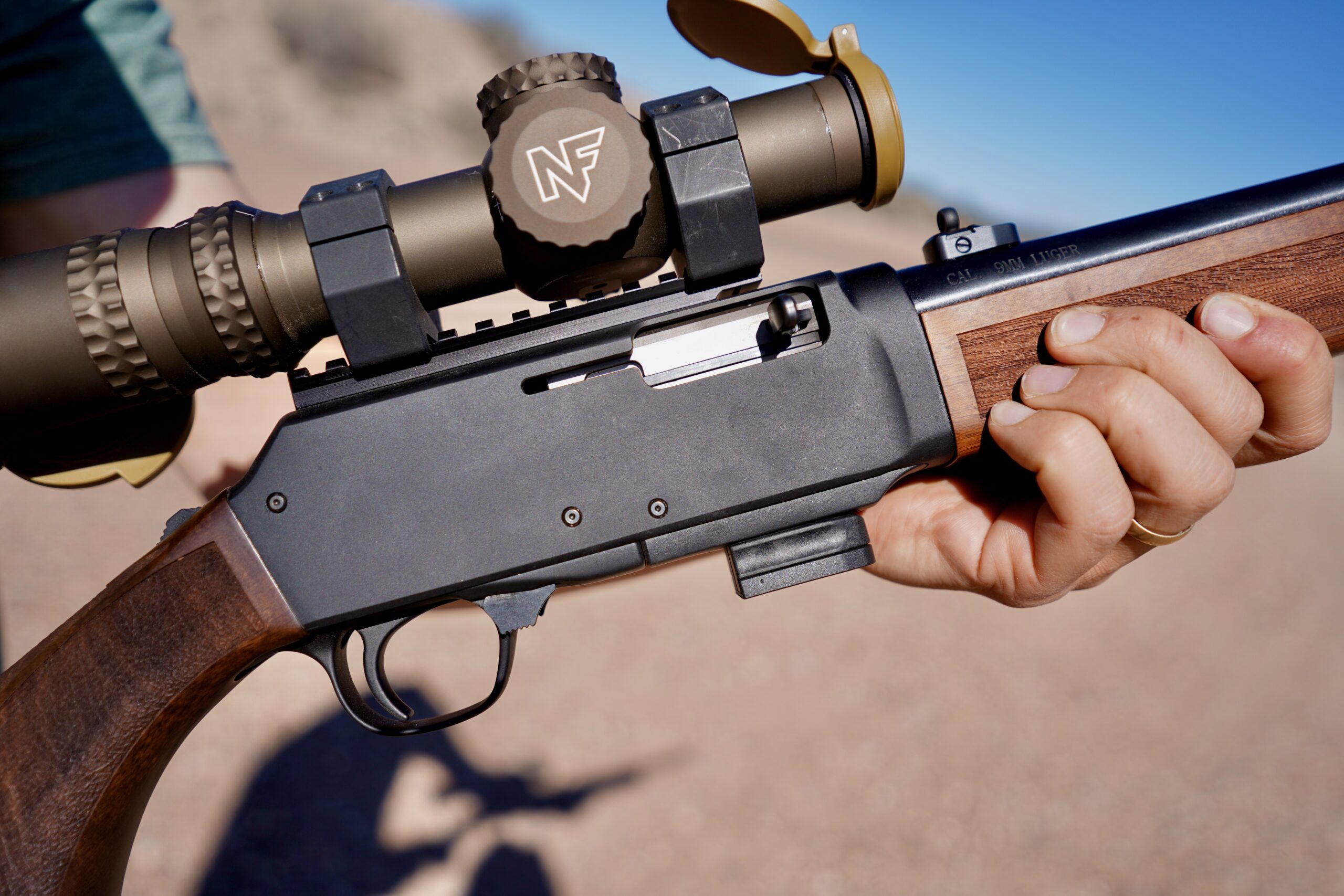
We topped it with a couple very fine LPVO scopes—a Leupold Mark 5HD 2-10×30 and a Nightforce ATACR 1-8×24. Both pieces of glass are, admittedly, overkill but we wanted to get the best accuracy possible from the carbine while testing for accuracy.
This rifle doesn’t require an optic at that level to perform, however. A simple red-dot reflex sight mounted on the rifle’s Picatinny rail is all the Homesteader really needs.
We ran the rifle a lot on Gunsite’s famed Scrambler, where it was right at home ringing the steel targets that are about 50 to 100 yards downrange. It functioned flawlessly here and throughout the week-long evaluation.
Getting picky about the rifle’s design, we did note a few things that could stand improvement. The recoil pad is thicker and squishier than needed. A thinner, harder pad would shorten the length of pull and make the rifle less likely to hang up on clothing as it is shouldered—both good things.
The team was split on the blocky fore-end. It reminded me of my old Crossman 7600 BB gun as a kid and brought images of the M1 Thompson to another judge, good associations both. Another judge thought it could benefit from a bit of contouring.
But in the end we were united in our appreciation of this fun little gun. If we gave out an award for top plinker, the Henry Homesteader would have it.
Report Card
- Performance: Good
- Design: Very Good
- Value: Fair
- Accuracy: 1.346 in. (Avg. of 10 best five-shot groups)
Bergara Wilderness Ridge Carbon Specs
- Action: Two-lug bolt
- Stock: Synthetic
- Caliber: 6.5 CM
- Capacity: 5+1
- Weight: 7 lb. 0 oz.
- Trigger: 2 lb. 15 oz.
- Barrel: 22 in.
- Length: 43 in.
- Price: $1,599
Our impressions of this new rifle from Bergara were mostly positive. We liked how it handled and balanced. It operated flawlessly, feeding, cycling, and ejecting everything we shot through it. Its intuitive controls make it easy (and fun) to operate.
That said, it didn’t exactly win our hearts either. For $1,599 we were expecting a bit more—particularly with its fit and finish and its accuracy.
It’s 1.346 in. five-shot group average was near the bottom of the test and is humdrum for a rifle chambered in 6.5 Creedmoor. It did manage three groups (from three different shooters using three different types of ammo) that were just above 1 MOA, which was encouraging. It was consistent, if not super precise.
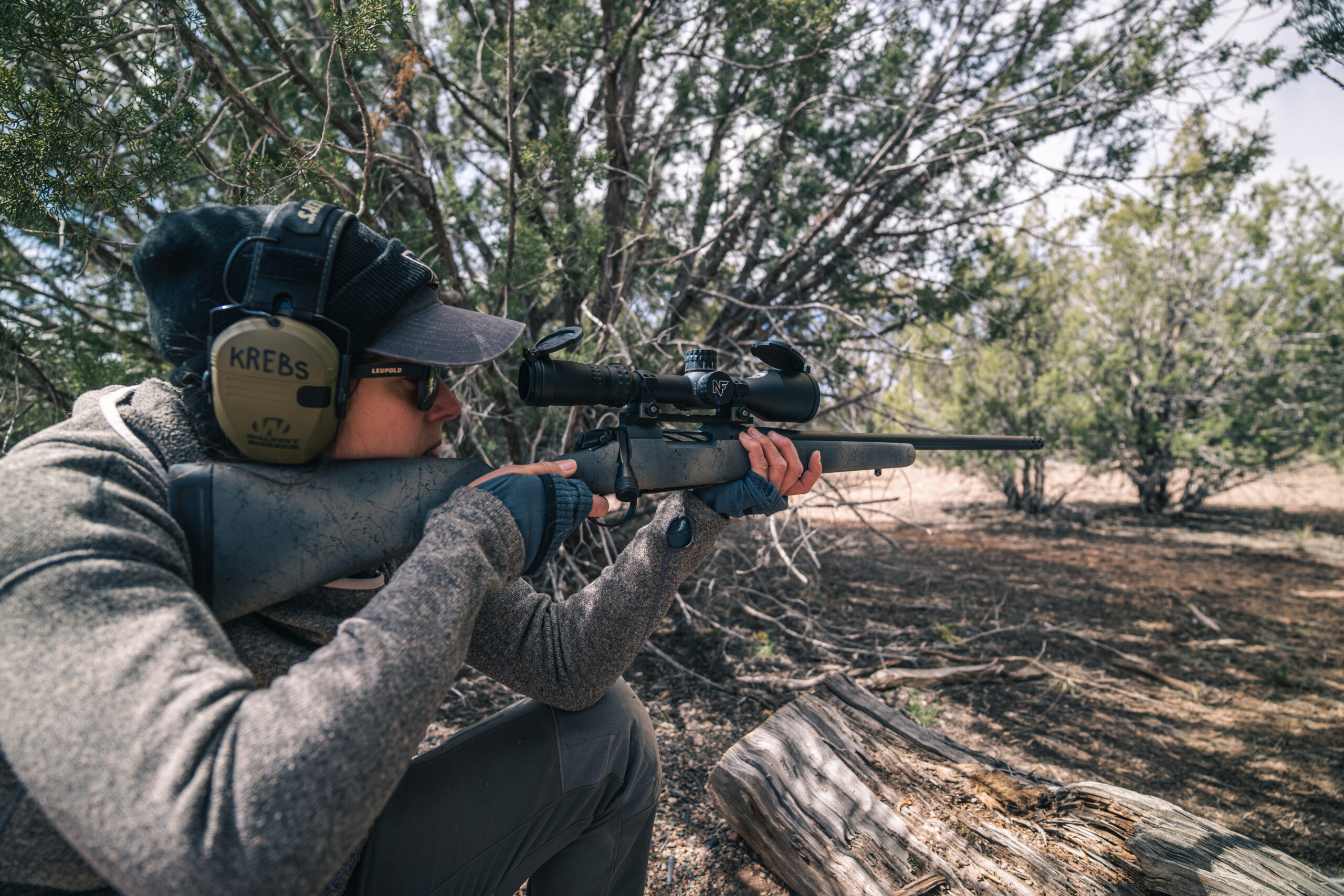
The stock also isn’t commensurate with a rifle costing this much. It’s a bit basic, as the kids say. The so-so fit of the hinged floorplate and the overall look and feel of the Remington style stock doesn’t scream “premium.”
The metal work is more in keeping with the price. The Sniper Gray Cerakote on the receiver contrasts nicely with the polished stainless bolt body, which has spiral flutes along its length that are offset in black. And the wrap on the carbon-fiber barrel is also attractive.
Overall, it struck us as a capable hunting implement. It comes with an effective radial muzzle brake that makes recoil a non-issue in 6.5 Creed. (The rifle is also chambered in .308 Win., 6.5 PRC, and .300 Win. Mag.) The single-stage trigger broke at a clean and crisp 2 pounds 5 ounces.
Report Card
- Performance: Very Good
- Design: Good
- Value: Good
- Accuracy: .719 in. (Avg. of 10 best five-shot groups)
Browning X-Bolt Target Max Specs
- Action: Three-lug bolt
- Stock: Synthetic chassis
- Caliber: 6.5 CM
- Capacity: 10+1
- Weight: 9 lb. 9 oz.
- Trigger: 2 lb. 5 oz.
- Barrel: 26 in.
- Length: 47.75 in.
- Price: $1,799
The Browning X-Bolt Target Max is in its element when you have steel targets hundreds of yards down range, variable winds to figure out, and a pile of accurate ammo to burn through. Everyone on the team really enjoyed shooting this hefty rifle from Browning that comes with a 26-inch barrel, three-port muzzle brake, and substantial competition-style stock.
Ours delivered good precision, with the average of its 10 best five-shot groups coming in at .719 inches. One judge on our test team, who isn’t as experienced with long-range precision rifles as some of the others, really liked the familiar feel of the X-Bolt controls, which include the two-position tang-mounted safety and short three-lug bolt throw.
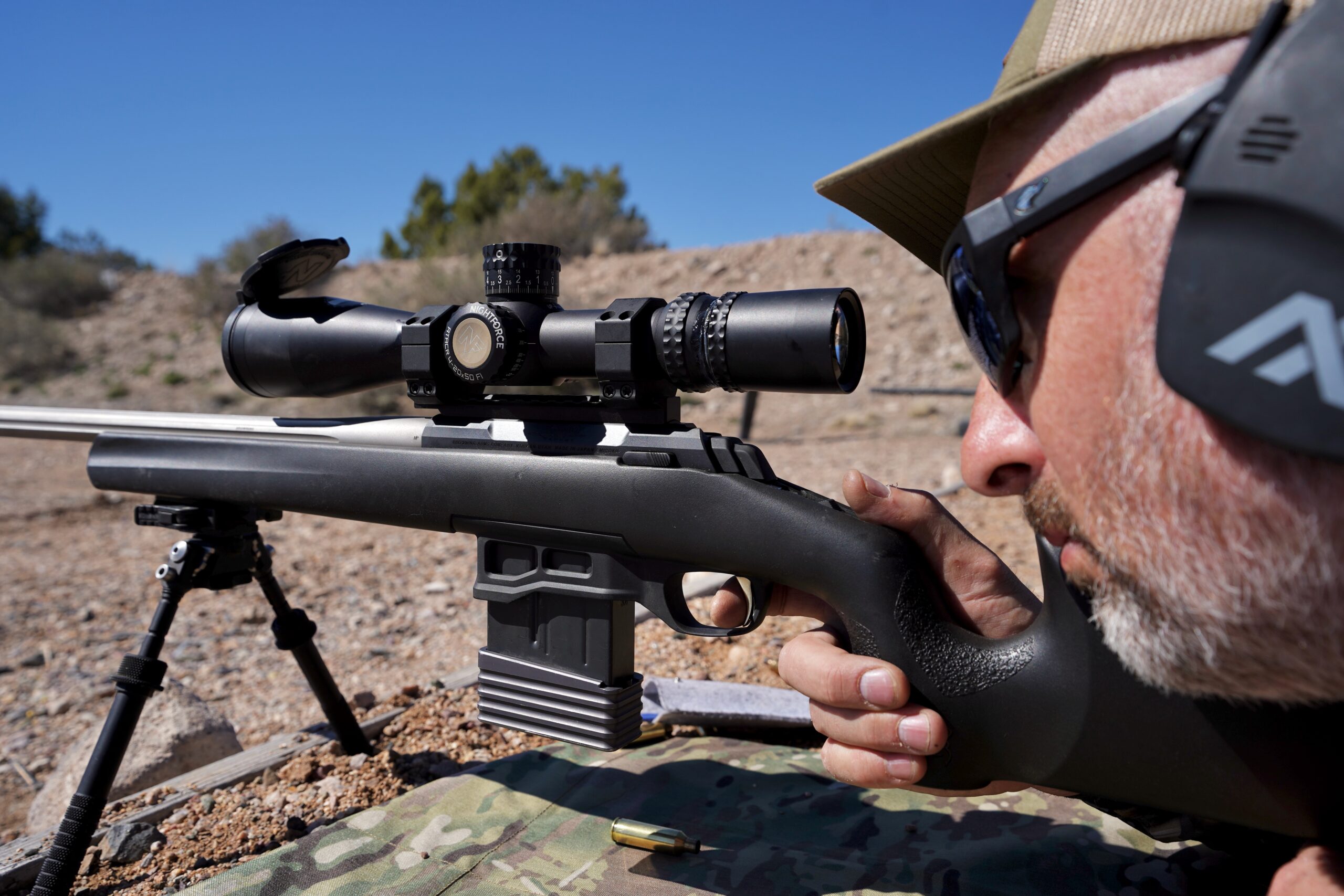
But the experienced precision rifle shooters liked it as well. The Target Max ran smoothly and reliably with one exception: It was very picky about which magazines it accepts. Like many precision rifles it is designed to accept AICS detachable magazines. The Browning ships with one polymer 10-rounder from MDT.
During the week of shooting we’ll run many different magazines through rifles of this type and that’s where the Target Max fell short.
We had a hard time inserting and seating most magazines in the mag well. On top of that, the magazine release button was difficult to manipulate, making mag swaps a chore. Browning placed the magazine release button on the side of the rifle between the trigger guard and magazine well unlike the typical paddle release you see on the bottom metal of most precision rifles.
The rifle could benefit from a couple upgrades to its feature set, too. QD cups (rather than swivel stud type attachments) should be standard on a rifle of this type and while the section of Picatinnny rail on the fore-end is useful for mounting a bipod, an ARCA rail (ideally running the whole length under the fore-end) would be an improvement.
The stock earned high marks otherwise. The vertical grip is well done and has some very nice texture molded into it. The rifle has a cheek piece that can be raised or lowered as needed and it comes with a spacer to adjust the length of pull.
Report Card
- Performance: Good
- Design: Good
- Value: Fair
- Accuracy: 1.459 in. (Avg. of 10 best five-shot groups)
Weatherby Mark V Backcountry 2.0 Ti Specs
- Action: Six-lug bolt (two rows of three)
- Stock: Carbon fiber
- Caliber: .338 Wby. RPM
- Capacity: 4+1
- Weight: 5 lb. 5 oz.
- Trigger: 3 lb. 3 oz.
- Barrel: 18 in.
- Length: 38.5 in.
- Price: $3,449

In many respects this rifle was the most interesting of the test—in part because it occupies a very curious—and small—niche. It’s expensive. It’s ultralight. And it’s chambered the brand new .338 Wby. RPM, a hard-hitting thumper of a magnum that is reasonably accurate, but no long-range wonder.
On the one hand, it seems kind of like a guide gun. It has an 18-inch barrel, compact 38.5-inch overall length, and 4+1 magazine capacity. But we’ve been around a lot of guides and not many are going to throw down $3,449 on a rifle they are going to beat the snot out of. On top of that, though the rifle is portable, it isn’t going to outshoot a less expensive .45/70 lever action, 12-gauge slug gun, or .338 to .375 magnum-type bolt gun when trying to cope with an irate bear.
I’m sure that some hunters will take to the rifle and cartridge as long as they don’t mind the 1.5 MOA performance. I could see humping it while slogging through a willow thicket in search of a trophy bull moose—or brown bear—where the shots will be relatively close. But it’s a fair bit of money to spend on a rifle with that small sweet spot.
Shooting it prone for accuracy was not the most fun we had during the test. Even though it has a good muzzle brake, it still hits fairly hard. But we had a lot of data to gather on the rifle and new round and soldiered through.
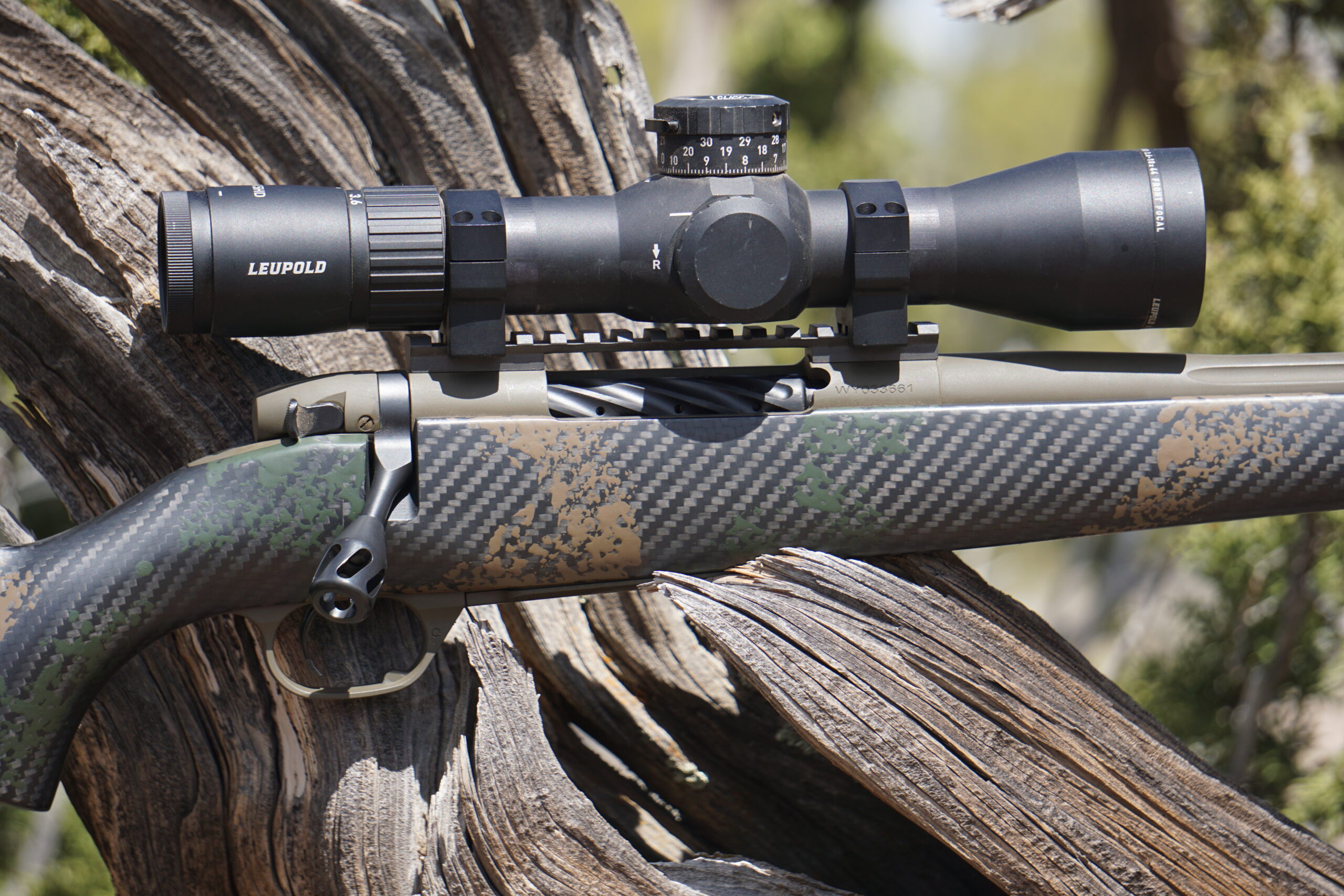
We shot four different loads through the rifle and recorded data using a Labradar. We were impressed by the results. The ammo was very consistent in terms of the standard deviation (SD) and extreme spread (ES)—especially for a short-barreled rifle shooting magnum powder charges in factory loaded ammo. All the data here are from 10-shot shot strings.
- 225-grain Nosler AccuBond (MV: 2686 fps / ES: 32 / SD: 10)
- 225-grain Barnes TTSX (MV: 2624 fps / ES: 30 / SD: 8)
- 225-grain Hornady Interlock (MV: 2688 fps / ES: 40 / SD: 13.0)
- 185-grain Barnes TTSX (MV: 2909 fps / ES: 42 / SD: 14.2)
When we started shooting the rifle during the practical field evaluation, we enjoyed it a lot more. The recoil isn’t bad when your body can rock with the blow, and the rifle is lithe and handy when working the bolt.
We really liked the ergonomics on the rifle. The stock has a negative comb with a quasi-hogsback shape and the recoil pad, the latest version of Weatherby’s 3-D printed design, is the best yet. Both help mitigate recoil.
The finish on the stock improves on what we’ve seen from Weatherby since they opened shop in Sheridan, Wyoming as well. The inletting is tight and even and the grip is smooth and clean with no signs of sanding or other handwork.
Final Thoughts on the Best Rifles of 2023
When it comes to the best rifles of 2023 we can borrow the favorite saying of shady pitchmen in infomercials, “But wait, there’s more!” Due to lingering supply chain issues, limited sample availability, and other factors, a bunch of gun companies have plans for new rifles this year which weren’t quite ready in time for the gun test.
Read Next: The Best 1911s, Tested and Reviewed
As the months progress we’ll continue to update this story with other relevant new rifles. And even though I’m not yet allowed to divulge specifics I can state that we’re going to see several high-end rifles that strive to balance the often incompatible qualities of being lightweight and extremely accurate.
In the meantime, 2023 is off to an encouraging start for rifle aficionados, especially those looking for great values.
About Gunsite
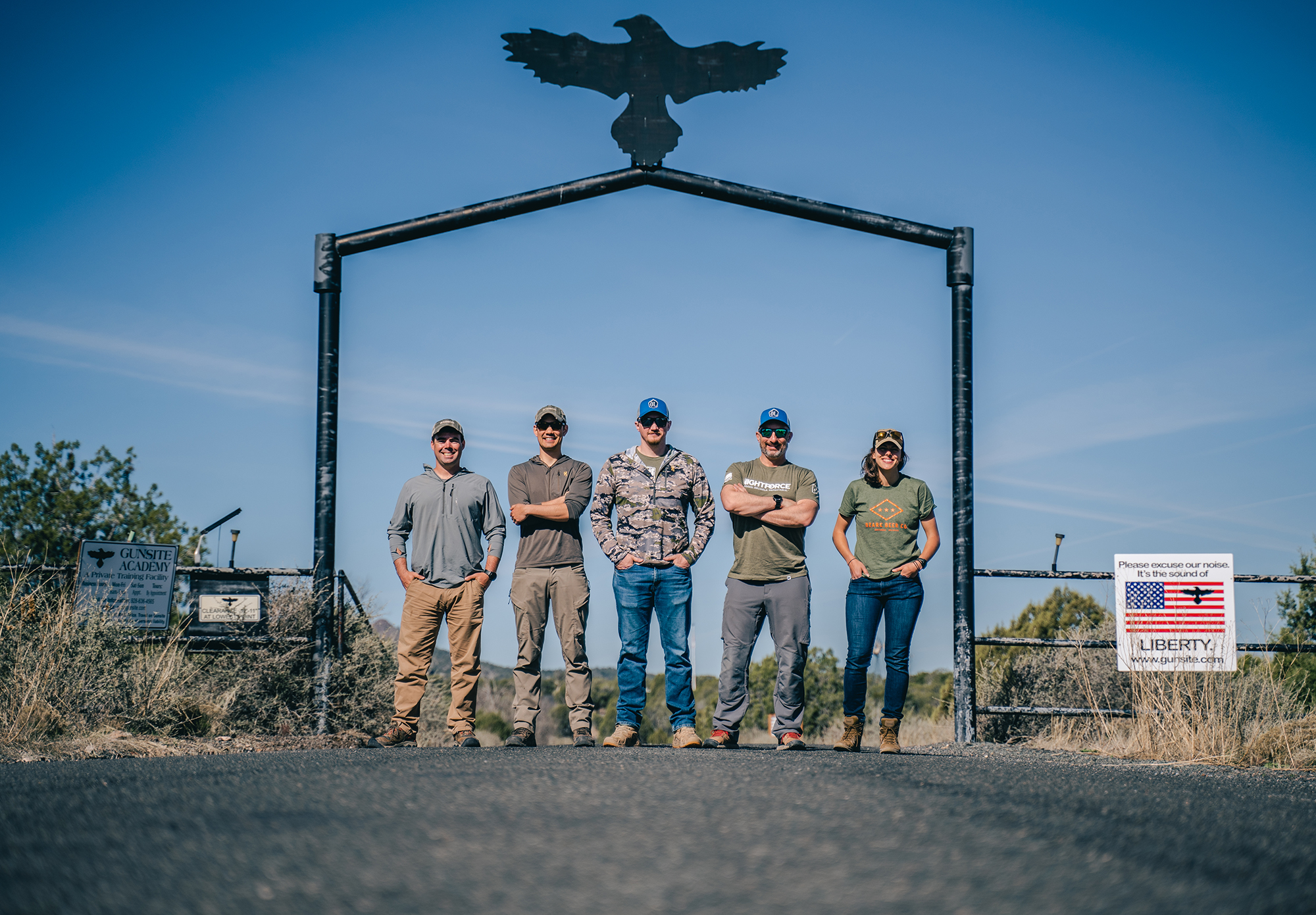
This year’s test of the best rifles was once again graciously hosted by Gunsite Academy in Paulden, AZ. As the home of the legendary Jeff Cooper and one of the first firearm training facilities that offered classes to the general public, Gunsite became one of the premier gun training destinations in the country.
At Gunsite we got to work with top-line instructors, and use their excellent ranges and facilities. The genuinely friendly, helpful, and overly-accommodating staff at Gunsite allowed us to conduct our most ambitious gun test to date. You can experience the magic of Gunsite, and improve your skills, by signing up for a class.

